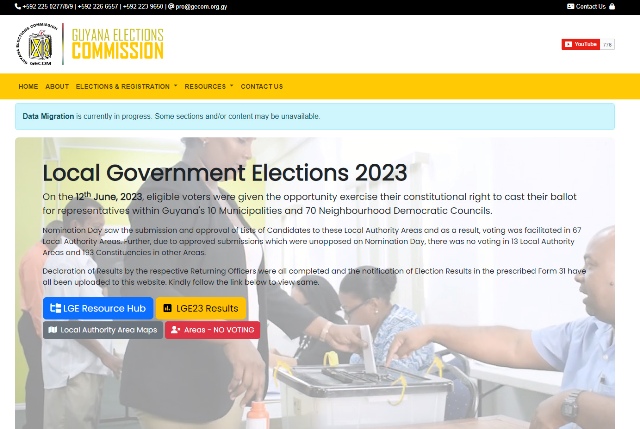 Guyana Elections Commission (GECOM) website
Guyana Elections Commission (GECOM) website
[This is an excerpt from an article in The Round Table: The Commonwealth Journal of International Affairs.]
Elections are steeped in controversy, with the Guyana Elections Commission (GECOM) often enmeshed. But the imbroglio of the March 2020 regional and general elections will remain by far the most controversial, with the aborted final tabulation of the vote, questionable decisions by the Chief Elections Officer and other election officials, and the refusal of the incumbent administration to accept defeat, setting the stage for extended legal battles and judicial interventions.
Not surprisingly, in the aftermath of the eventual swearing-in of President Irfaan Ali of the PPP/C, he promised the establishment of an independent Commission of Inquiry to review the outcome of the elections. On 13 September 2022, the Commission was formally appointed under section 2 of the Commissions of Inquiry Act of Guyana and it submitted its report in April 2023.
Challenges facing the new government of Guyana
CARICOM and the 2020 unsettled elections in Guyana: a failed political (legal) solution?
The three-person Commission, under the chairmanship of Justice Stanley John, was given the unenviable task of inquiring into and reporting on attempts to undermine and frustrate the legally prescribed process for the counting, ascertaining and tabulation of votes and on attempts to prevent a true declaration of the results of that election. The Commission was also asked to determine the counting and tabulation of votes polled and the public declaration of those results by the Returning Officer of electoral District No. 4 and what attempts were made to obstruct, frustrate, subvert, and prevent a decision of the GECOM to conduct a national recount of the votes from being executed and implemented, and by whom.
While quite instructive, the Report will not end election disputes but will certainly bring to a closure what can be described as perhaps the ugliest chapter in the electoral history of the country where election officials were compromised and where they participated in a blatant attempt to steal an election. The report is an indictment of the Chief Elections Officer and the systems in place that were supposed to ensure impartiality by election officials and ultimately that the will of the people was in fact respected. The Report of the Commission concluded that:
there were, in fact, shockingly brazen attempts by Chief Election Officer (CEO) Keith Lowenfield, Deputy Chief Election Officer (DCEO) Roxanne Myers and Returning Officer (RO) Clairmont Mingo to derail and corrupt the statutorily prescribed procedure for the counting, ascertaining and tabulation of votes of the March 2nd election, as well as the true declaration of the results of that election, and that they did so – to put it in unvarnished language of the ordinary man – for the purpose of stealing the election.
The report further highlighted the blatant irregularities, clumsy conspiratorial attempts at electoral fraud by a cabal of election officials, and the naked partiality of some election officials. The Commission reported that senior election officials ‘abandoned all need for neutrality and impartiality and demonstrated a bias for a competing political party and … an open connection with that party and by their efforts sought a desired result for that party’. This included a ‘conscious and deliberate – even brazen – effort to violate the provisions’ of the ROPA [Representation of the People Act] for voter tabulation and an attempted premature and ‘unlawful’ declaration of ‘falsified’ results for the contested Region 4, even in the context of an incomplete tabulation. The Commissioners stated that the CEO, DCEO, and RO Mr Clairmont Mingo were principally responsible for clear and deliberate attempts to frustrate, obstruct and subvert the ascertainment of votes in electoral district No. 4.
Clearly Guyana to date has not accepted that in every electoral contest there must be winners and losers. This situation is made more acute given the model of governance in the country in which the winners derive all the executive and legislative power and in which the losers rarely have the opportunity to make a major impact on decisions. While the report should close this unhappy chapter in the electoral history of the country, the continuing failure to find a working settlement that would create meaningful opportunities for all ethnicities and groups, the failure to reach some kind of governance accord that will not lock the losers and their ethnic base communities out of the decision-making process and share of the wealth of the country do not augur well for the long-term prospect of the democratic well-being of the country and its overall development, especially having become oil-rich recently.
Cynthia Barrow-Giles is Professor of Political Science, University of the West Indies, Barbados and Ronnie Yearwood is Lecturer in Law, University of the West Indies, Barbados.



